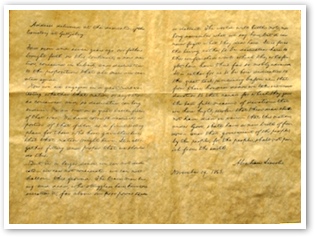A President's speech, almost biblical in scope and power
- FATHER RAYMOND J. DE SOUZA
At Gettysburg, 150 years ago today, Abraham Lincoln rewrote the very idea of America. And he did it in a mere 278 words.
 |
click to enlarge
|
"The world will little note, nor long remember what we say here, but it can never forget what they did here." — Abraham Lincoln at Gettysburg, November 19, 1863.
The president was prophetic, but failed at prediction. The world has mostly forgotten what "they" did: Few now can give an accurate account of the Civil War, let alone the place of Gettysburg in it. Yet today, the world does take sesquicentennial note of what Lincoln said in that Pennsylvania town. Sometimes, words are more powerful than deeds. The pen, even in war, can be mightier than the sword when wielded by one such as Lincoln.
Lincoln faced a serious charge in the Civil War, namely that he was employing the brute force of the federal government to compel the southern states to adopt a way of life contrary to their culture and to which the American constitution entitled them. At Gettysburg, Lincoln answered the charge by appealing neither to the constitution (1787) nor the Bill of Rights (1791), but by going back to the Declaration of Independence in 1776 — the "fourscore and seven years ago."
The 18th-century American constitution, including the Bill of Rights, had made its peace with slavery. The abolition of slavery by the 13th amendment (1865) and the equalprotection clause of the 14th amendment (1866) would demonstrate that the constitution had to be corrected in light of the antecedent proposition, contained in the Declaration, that all men were created equal.
Lincoln was setting out to change the American constitutional order. But if he were to prevail only by force of arms — by winning the battles at Gettysburg and elsewhere — the new settlement would be precarious. So Lincoln did something more bold: He reinterpreted the American founding by sheer rhetorical force.
No longer was America primarily a project of the constitution's "more perfect union." Now, it was about "a new nation, conceived in Liberty, and dedicated to the proposition that all men are created equal."
What Lincoln launched at Gettysburg resonated not only in the Civil War but across the years until today. Lincoln elevated equality alongside liberty and unity as founding principles. And if the central government needed to assert its power to secure that equality, including war, then so be it. In the centennial year (1963) of the Gettysburg Address, Martin Luther King marched on Washington precisely to insist that federal power should be expansively exercised to secure the equality promised in the Declaration and Lincoln's own Emancipation Proclamation, also of 1863.
All of that was achieved in two minutes of public utterance. So powerful were Lincoln's words that the only suitable parallels are biblical. |
In the 150 years since Gettysburg, and all the more so in the 50 years since King, the increase in government power to protect equality has been continuous and enormous. Indeed, what Lincoln formalized at Gettysburg marked a shift that is by now complete in Western democracies — namely, the idea that protecting equality justifies a larger state, even should liberties be constrained.
All of that was achieved in two minutes of public utterance. So powerful were Lincoln's words that the only suitable parallels are biblical.
The biblical word shapes reality, as opposed to merely describing it. The biblical allusions are clear at Gettysburg. Indeed, "government of the people, by the people, for the people" first appeared in the prologue to the 14th-century Wycliffe Bible, the first translation of the Bible into English. Whether Lincoln knew of that is uncertain, but it is likely given his wide biblical literacy.
Gettysburg was Lincoln's most famous and consequential speech, yet it will be underappreciated this week as America turns its attention to the 50th anniversary of John F. Kennedy's assassination in Dallas. (JFK himself skipped the centennial of Gettysburg to campaign in Texas that week.) President Barack Obama was joined by Bill Clinton and Jimmy Carter to mark the 50th anniversary of the March on Washington this summer at the Lincoln Memorial. As for the memorial Lincoln dedicated, Obama is skipping the ceremony today in Gettysburg, even though it is a five-minute helicopter ride from Camp David. But it was Gettysburg 1863 that made Washington 1963 possible, and shaped the world we live in 150 years later.
 This is Meaghen Gonzalez, Editor of CERC. I hope you appreciated this piece. We curate these articles especially for believers like you.
This is Meaghen Gonzalez, Editor of CERC. I hope you appreciated this piece. We curate these articles especially for believers like you.
Please show your appreciation by making a $3 donation. CERC is entirely reader supported.

Acknowledgement
Father Raymond J. de Souza, "A President's speech, almost biblical in scope and power." National Post, (Canada) November 19, 2013.
Reprinted with permission of the National Post and Fr. de Souza.
The Author
Father Raymond J. de Souza is the founding editor of Convivium magazine.
Copyright © 2013 National Post



